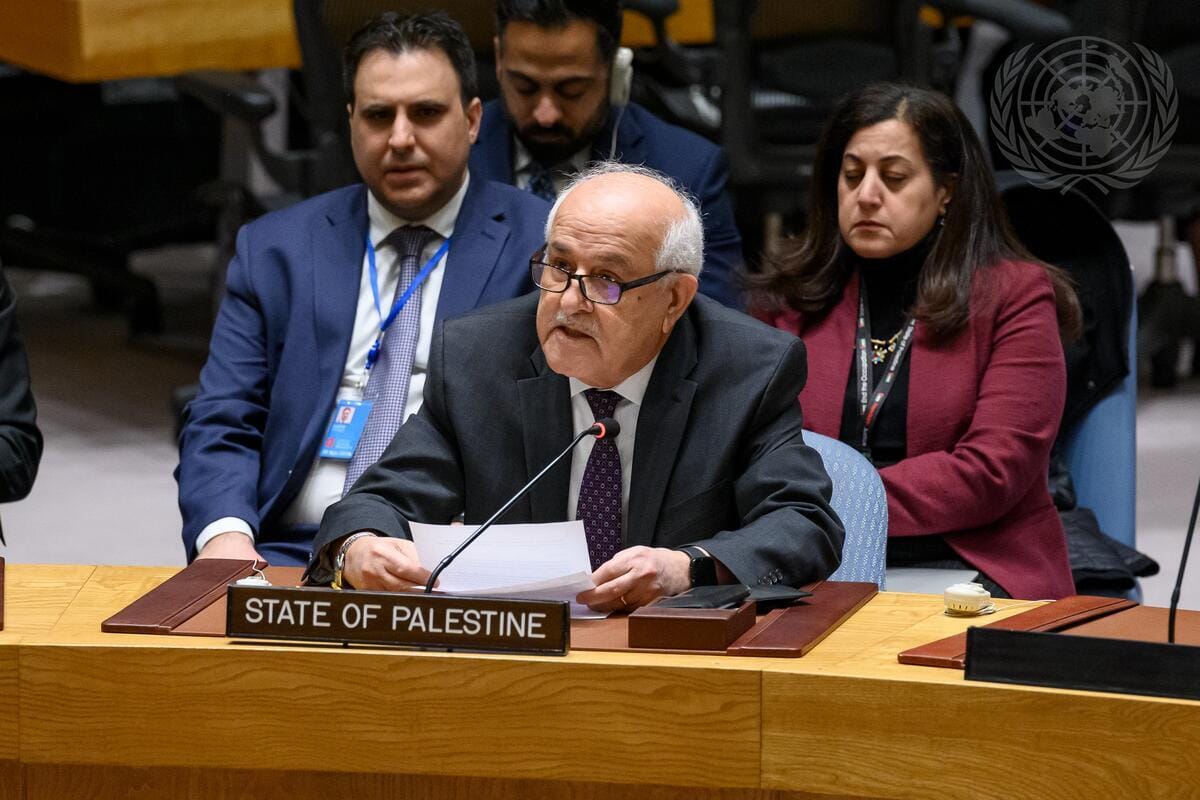The United States has shamed itself by blocking a UN resolution that would have demanded a ceasefire in Gaza and the immediate and unconditional release of all hostages. The United Arab Emirates had submitted the resolution today that called for a humanitarian cessation of fighting between Israel and Hamas fighters, in which an estimated 17,000 Palestinians have been killed and 1.9 million people have been displaced since the war began in early October. The vote came after UN Secretary General António Guterres invoked Article 99, a rarely used provision in the UN Charter, to deal with what he called an impending “humanitarian catastrophe” in Gaza. He further said that the humanitarian support net in Gaza faces a “severe risk of collapse.”
The U.S. cast the sole vote against the U.A.E.-submitted resolution in the UN Security Council, thus vetoing it. The United Kingdom abstained, while the remaining 13 members of the UN Security Council voted for the resolution. Speaking before the vote, the U.A.E.’s Mohamed Issa Abushahab declared that the draft resolution drew co-sponsorship from at least 97 member states of the UN within 24 hours. The vote this afternoon had been preceded by speeches from the members of the UN Security Council, which only highlighted the U.S. diplomatic isolation illustrated by the vote tally.
Guterres opened the morning session by highlighting the impending humanitarian crisis and warning of the crisis spilling over into Egypt, Lebanon, Syria, and the region in general. He referenced the 130 deaths of UN employees in the conflict, and said that UN personnel often bring their families to work with them, since they consider it would be better to live or die together. Guterres said that the displaced residents of Gaza were like human pinballs, ricocheting without safety in the war zone. While he unequivocally condemned the violence by Hamas, Guterres said that that cannot justify Israel’s collective punishment against the Palestinians. He ended by calling for a ceasefire and ultimately for the two-state solution, which would benefit both Israel and Palestine.
Guterres’ statement was followed by the remarks of the Permanent Observer for the State of Palestine Riyad Mansour. Mansour called on the Council to act to end Israel’s “carpet bombing” of the Palestinian people. He subjectively challenged the participants by asking whether the Council is supposed to pretend that Israel’s objective is not the ethnic cleansing of the Gaza Strip, given the lack of a clear Israeli military objective. “Don’t let them fool you,” he said. He further described the Israeli objective as making Gaza unlivable in order to push them farther south where they will be further attacked. Mansour said the Israelis intend to end Palestine and the Palestinian people. He said this was a moment in history where people would be asked where they stood.
Israel’s Ambassador Gilad Erdan spoke next and asked why Guterres had not invoked Article 99 after the crisis in Ukraine, or Syria’s (alleged) use of chemical weapons, or Yemen. Erdan then proclaimed that the path to peace was through war, and that Israel was eliminating Hamas for the good of Palestinians, as well as Israelis.
Abushahab of the U.A.E. likened the effect of Israel’s military operation against Gaza to what Allies did to Dresden in World War II. He said that the siege of Khan Younis represented a new and dangerous phase of the war. Abushahab also cited the rise of anti-Semitism as a derivative of the conflict.
Russia’s First Deputy Representative to the UN Dmitry Polyanskiy warned of plans by Israel, and supported by the U.S., to flood the Hamas tunnels in Gaza with seawater. Polyanskiy cited the obvious reality that civilians have taken refuge in the tunnels, but moreover, the seawater used to flood them would pollute the groundwater for centuries. Polyanskiy then shifted from Russian to Arabic, telling the Council that Russia adds its voice to a permanent ceasefire and to get to the root cause of the conflict. Russia denounces the civilian deaths, he asserted, and does not accept a new Nakba, referring to the 1948 displacement of the Palestinians. In addition to the pursuit of a two-state solution according to the 1967 UN Resolution 242, Polyanskiy said that Russia is preparing to multiply its efforts in coordination with its partners.
China’s Ambassador Zhang Jun followed Polyanskiy, saying that there were no words to describe the tragedy and warned of the conflict spreading further in the region. The speech by Barbara Woodward of the United Kingdom reflected the British Empire’s neutral stance, while De Riviere of France indicated support for a cessation of hostilities that could lead to a permanent ceasefire. The speech by the last member of the permanent members of the UN Security Council, Alternative Representative Robert Wood of the United States, was unremarkable, other than reflecting the veto that would sabotage the ceasefire and release of hostages.
The remaining speeches reflected the support that led to 13 votes in favor of the U.A.E.’s resolution, and whose summaries are here. Egypt spoke on behalf of the Arab Group (Egypt, Palestine, Jordan, Saudi Arabia, and the Arab League); Qatar spoke on behalf of the Gulf Cooperation Council; Indonesia spoke on behalf of Bangladesh, Malaysia, Maldives, Türkiye, and other “like-minded countries.” The EU’s representative also endorsed the resolution.
In the end, with such massive support in the United Nations, the United States stood alone in wielding its veto. Moreover, given that a majority of U.S. citizens support a ceasefire in Gaza, the question is now: Who was represented by this outcome?






